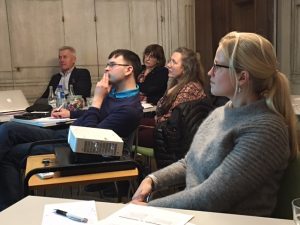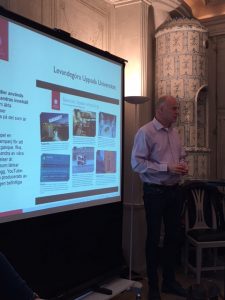(Original Swedish post published 19 January, English version posted 20 January.)
Every semester, the Management Council starts up with an overnight conference. The Vice-Chancellor, Deputy Vice-Chancellor, University Director, vice-rectors, deputy vice-rectors, and some students and officials gather to discuss issues of general relevance. On this occasion, we spent 24 hours together at Krusenberg Herrgård.
In the autumn, we devoted the Management Council overnight conference and deans’ meeting to strategic intelligence and foresight. This time we turned our attention inwards to focus on what’s going on in our organisation and discuss our strategic priorities.
I kicked things off with an account of the external factors governing our activities – the Higher Education Act and Ordinance and our appropriation directions. Sometimes it’s useful to recall what they actually say. For example, sometimes people talk about ‘third stream activities’. These are no longer mentioned in the legislative text – it talks about education, research and collaboration. It also explicitly mentions the obligation to promote gender equality, broader recruitment and sustainable development. We also went over our own governance documents – our Mission and Core Values, other statements of goals and strategies, programmes and action plans.

The first Management Council overnight conference with the present Vice-Chancellor and Deputy Vice-Chancellor took place in August 2012, also at Krusenberg Herrgård. It was then that we formulated our strategic priorities: quality, internationalisation, skills and careers, and infrastructure. The Vice-Chancellor and Deputy Vice-Chancellor went over what we had done about these issues up to now, how we had gone about it and how we intend to continue. Wednesday’s programme continued with the vice-rectors, students and administration presenting how they are putting the priorities into practice in their particular area and the challenges they foresee in the future.
It all added up to an impressive survey of everything that’s going on. It’s interesting to see that there is substantial agreement, though there are differences as well. Our conclusion was that we had come a long way in several areas but that the priorities generally still hold, though the emphasis and nuances vary.
We need to carry on working on some key issues. Perhaps the University needs an education strategy that encompasses the entire range of quality, internationalisation, careers and skills, and infrastructure? A strategy that takes a holistic approach and includes both educational development and study environments. Should we conduct a Quality and Renewal exercise for collaboration to map the University’s collaboration activities?
The second day’s exercises focused on social media. We learned about how the University is currently using social media for news coverage, strategic intelligence, research communication and student recruitment. During this session David Nygren and Joachim Ekström from the Communications Division were with us. The discussion after their presentation focused on what more we can do. What sort of presence should we have in social channels? When should we not use social media? What is our responsibility as a university in a time of fact resistance? What sort of support do we need to develop for researchers, teachers and the management?

We had 24 hours of intense discussions which underlined how important it is to meet, discuss, learn more about one another’s areas and activities, and get to know one another a bit better. This will make it easier for us to work together in the Management Council moving forward. And it does no harm that we had a good time together.


